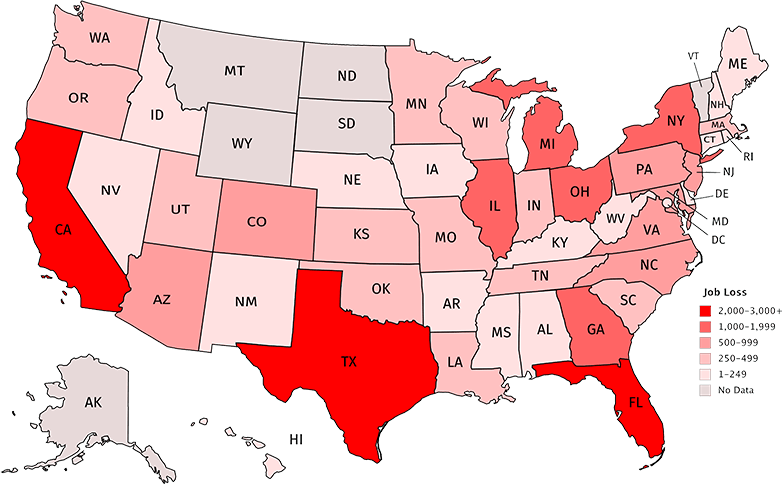The proposed T-Mobile and Sprint merger is bad news for workers and consumers.
While T-Mobile and Sprint are making vague promises that the merger will create thousands of jobs in the U.S., the data and the companies' track records tell a different story.
Wall Street analysts project that the merger will result in massive job cuts from the elimination of duplicative retail stores. When pressed on the issue at a Senate hearing, T-Mobile CEO John Legere conceded that "there'll be a rationalization of jobs in the first year" - a corporate-speak admission that the merged company plans to lay off thousands of workers.
CWA's comprehensive economic analysis finds that the merger will result in the loss of 30,000 U.S. jobs.
Summary of Estimated Job Losses from Proposed Merger
| Type of Work | Net Job Loss |
| Retail-Postpaid (T-Mobile, Sprint) | 13,700 |
| Retail-Prepaid (Boost, MetroPCS) | 11,800 |
| Headquarters | 4,500 |
| Total | 30,000 |
Estimated Retail Job Loss By State

Click Here to View State-By-State Job Loss Numbers
T-Mobile's January 2018 acquisition of iWireless, a regional carrier in Iowa, shows what happens to jobs when T-Mobile takes over. The company closed more than 72 percent of iWireless corporate stores and more than 93 percent of authorized dealer stores. T-Mobile also shuttered iWireless customer call centers in Des Moines and Cedar Rapids, Iowa.
T-Mobile and Sprint both have long track records of offshoring U.S. jobs. T-Mobile and Sprint offshore a significant portion of call center work to the Philippines, Guatemala, Honduras, India, Mexico, Panama, the Dominican Republic, Costa Rica, and Canada.
In 2012, T-Mobile laid off 3,300 workers when it closed seven U.S. call centers. T-Mobile attempted to deny its displaced workers much-needed federal benefits by denying that the work was sent overseas, but a U.S. Department of Labor investigation concluded that the jobs had been offshored. In 2016, Sprint closed U.S. call centers that employed 2,500 people and sent the work overseas to the Philippines.
The companies' well-documented recent history of cutting jobs following a transaction and significant offshoring of U.S. jobs raises questions about the credibility of their future plans to preserve, create, and return jobs to and in the U.S.
Wages will suffer too. The proposed merger will leave retail wireless workers worse off by reducing the number of national wireless retail employers from four to three. Fewer employers means reduced competition for labor, which leads to lower wages and reduced benefits.
Collective bargaining can help counter this effect, but T-Mobile and Sprint have long histories of violating workers' rights.
T-Mobile has an aggressive policy to deny employees their legal right to form a union. T-Mobile has been guilty of violating U.S. labor law six times since 2015 and has been subject to approximately 40 unfair labor practice charges since 2011. Sprint's violation of workers' rights dates back to the landmark La Conexion Familiar case in which Sprint fired 226 employees and closed its Spanish-language telemarketing center in San Francisco to avoid a union election.
The Bottom Line? The FCC should not approve the merger without verifiable and enforceable commitments on jobs and workers' rights from T-Mobile and Sprint
Unless the companies agree to ensure that no T-Mobile or Sprint employees will lose their jobs as a result of this transaction, commit to returning all overseas customer call center jobs to the U.S., abide by all labor and employment laws, allow their employees to form a union of their own choosing, free from any employer interference, the FCC should not approve this merger.
